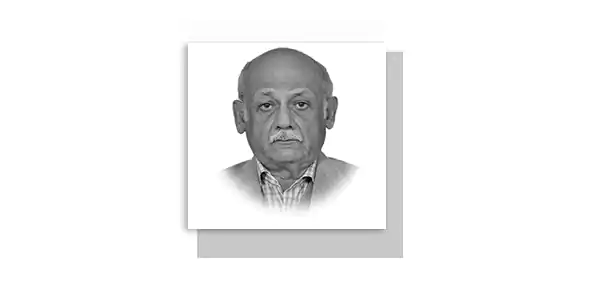THE religious beliefs of the founding fathers of Pakistan and their political ideology of an Islamic country were completely different from what this country is today. Originally Pakistan’s official name was the Republic of Pakistan and not the Islamic Republic. The law minister in the first cabinet hand-picked by Mohammed Ali Jinnah was a Pakistani Hindu called Jogendranath Mandal and the first Foreign Minister was an Ahmedi that is Sir Zafar ullah Khan.
During the last few decades religious extremism in the country has risen to extremely dangerous levels and unfortunately this extremism has destroyed the global image of not only Pakistan but all the Muslims around the world. In this age of the internet and social media it has become very easy for extremists all over the world to communicate with each other and to convert gullible young Muslims to their religious views and political philosophy.
Today the movement of extremist Islamic views has become global with followers and adherents in countries including Pakistan, Turkey Afghanistan, Indonesia, Malaysia and several African states. Extremist philosophy was seen on the streets of New Orleans very recently when a recent convert to Islam ploughed a truck into a crowd of people welcoming the New Year. He managed to extinguish the lives of 14 people and injured many more after converting to Islam he had adopted the Muslim Name of Shams-Din-Jabbar. He was shot dead by the local police after committing the gruesome act of murder. In his van was found the flag of the Islamic state and by the show of this flag he was trying to prove his loyalty with the cause of ISIS and hoped to attract other young men to his cause.
The killings in New Orleans revived an interest in ISIS and reminded the followers that ISIS is a Sunni organization very critical of the Shia sect of Islam and against all countries with a Shia ruling class. Iran today is the biggest Shia majority country and is fully involved in the Middle East crisis of Ghaza and perhaps the only Muslim country fighting to help the Palestinians in their struggle against Israel.
The Islamic extremist organization called ISIS or Daesh was created after the American invasion of Iraq in 2003. The Govt. of George W Bush launched the Iraqi Invasion to get rid of Saddam Hussein who allegedly was producing weapons of mass destruction that were not found despite a thorough search of the entire country.
Saddam was toppled subsequently captured and hanged but no trace of any weapons of mass destruction was found in Iraq. In the political vacuum created after the regime change religious groups believing in the Islamic Ideology were formed to oppose the American occupation of Iraq and a combination of some groups formed ISIS or the Islamic State of Iraq and Syria led by a fire brand cleric called Abu Bakar Al-Baghdadi. ISIS rose from the ashes of Baghdad during the fierce civil war the aftermath of the Arab Spring of 2011that had destroyed the rule of many dictators in the Arab world such as Qaddafi, Hosni Mubarak and Ali Abdullah of Yemen.
By 2014 ISIS had taken over large swaths of territory in Iraq including Mosul the second largest city in the country and declared the establishment of the Khilafat a system of governance based on the Islamic Sharia laws.
After assuming power and control in large parts of Iraq ISIS now launched a campaign of terror across the continent of Europe.
In October 2019, the United States intelligence services followed Baghdadi and killed him, an act announced to the world by President Donald Trump saying that the man killed was “the founder and leader of ISIS, the most ruthless and violent terror organization in the world”. He added: “We obliterated his caliphate, 100 percent, in March of the year.”
The Afghan chapter of SIS is called ISIS Khorasan and this group carried out two bombings in Iran during the memorial service for general Qasem Soleimani an Iranian military leader killed by an American drone attack in 2020 this attack by ISIS resulted in the death of 80 innocent people and numerous others were severely injured
A few months after the Tehran operation, American officials blamed ISIS-K for a deadly concert hall attack near Moscow that killed at least 137 people. In June 2024, ISIS claimed responsibility for a shooting in Oman that killed six people and injured 30 more near a Shiite mosque. Pakistan too is not out of reach of the terror machine called ISIS as it is very much active in the border areas near Afghanistan and is even daggers drawn with the fanatical regime of the Taliban who they accuse of not enforcing true Islam in Afghanistan.
Pakistan has no comprehensive state policy or a consistent plan for state action in place to fight the menace of religious extremism. There have been hardly any vigorous attempts by the state to counter the religious-extremist worldview and the actions it inspires.
Most current manifestations of extremism are related to an Islamic conception of jihad for the establishment of a purportedly Islamic state. The police, the primary law enforcers in the country, bear the heaviest burden in combating this deadly menace.
Despite the surge in terrorist attacks in Pakistan since 2005, there has been no consistent effort to address the roots of the problem. These attacks spiked in 2009 and while they appeared to recede in 2011, the frequency remains worryingly high.
Terrorist attacks are not new to Pakistan, and per one estimate, there have been at least 4,438 attacks in the country between 1974 and 2010.1 Fatality figures vary, but according to one estimate, over 80,000 have been killed in terrorist attacks between 2003 and 2012.
—The writer is Professor of History, based in Islamabad.










